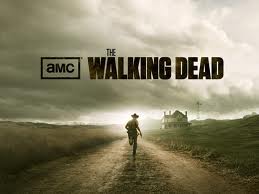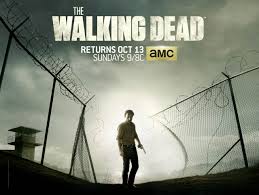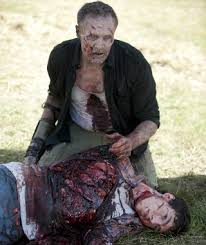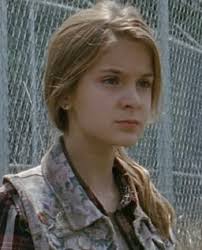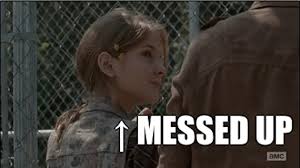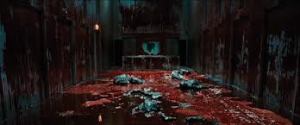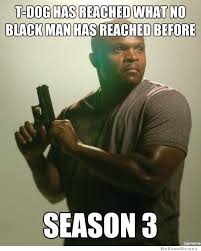Ask this philosopher what her favorite TV show is.
Go ahead. Ask.
Ok then, I’ll tell you. My favorite TV show is The Walking Dead.
You know, the one with the zombies.
Although it’s (just) a show about zombies, The Walking Dead is basic cable’s highest rated scripted drama.
It’s been on for four seasons. Here are each of the season’s posters:
Oh yeah, this is the poster for the second half of season 4.
All of the posters have the character Rick Grimes on it. He’s the star of the show.
Rick does stuff and things.
So far, season 4 has been kinda slow.
Although season 4 has been a bit on the slow side, no matter how boring a season of The Walking Dead gets, you can guarantee a season will include a few things:
- Plenty of zombie blood and guts
- A likable bad guy
- Soap opera-esque dialogue (except for Michonne. She barely says anything)
- The T-Dog Effect*
- The constant fangirl threats of “If Daryl dies, we riot”
And Rick Grimes totally eye F-ing the camera.
The Walking Dead is certainly tainted with zombie-flavored melodrama, but a little known fact is that the show is packed with philosophy – if you decide to look for it.
That is, if you can get past visuals like this:
Or this:
Or this:
A recent philosophically-packed episode had something to do with the death of the character Lizzie Samuels.
What makes the death of Lizzie philosophically significant isn’t just the fact that Lizzie is a child, but also the utilitarian justification for her killing.
That’s right, I said killing.
Someone intentionally kills Lizzie Samuels.
That person is Carol.
That’s right. Carol.
The same person who killed David and Tyreese’s girlfriend Karen, Carol.
This is what happens:
In The Walking Dead season 4 episode titled “The Grove”, Carol, Tyreese, baby Judith (Grimes), and the Samuels sisters, Lizzie and her younger sister Mika, find an abandoned farm. Once there the group decides to – you know, nevermind. Long story short (too late) Carol and Tyreese discover that there is something seriously wrong with the eldest Samuels sister Lizzie.
Lizzie Samuels is a psychopath.
Lizzie expresses an unnatural fondness for zombies (or “walkers”) that endangers the lives of the small group. Lizzie believes that zombies are not dangerous and that zombies are her friends.
Wait. It gets worse.
Not only does Lizzie believe that flesh-eating zombies are capable of sustaining friendships, she believes that becoming a zombie isn’t such a bad thing.
Oh – before I forget – before Carol, Tyreese, Judith, Mika, and Lizzie found the farm they were are a prison. Someone at the prison was feeding rats to the zombies and eviscerating small animals. That person was Lizzie.
Lizzie also named the zombies.
She became quite fond of one she named “Nick”.
This, as you may see, is a problem.
I think it might be the right time for a list.
THIS IS WHAT IS WRONG WITH LIZZIE SAMUELS:
- Lizzie freaks out when she discovers that someone has “killed” Nick.
- Lizzie violently admonishes Carol when Carol kills a zombie (Lizzie claims she was merely playing with the potentially dangerous flesh eater).
- Lizzie fails to (re)kill a zombie when a revenant threatens the lives of Lizzie, Mika, and Judith.
- Lizzie expresses reluctance to kill any zombie (she does not, however, have any difficulty killing the living).
- While “protecting” Rick Grimes’ infant daughter Judith, Lizzie attempts to smother the child.
- And lastly, Lizzie kills her sister Mika.
It’s okay, Lizzie says. Her sister will come back.
Oh yeah, after killing Mika, Lizzie intends to kill Judith.
Carol and Tyreese conclude that Lizzie must be dealt with. But how? Lizzie is a child and any extreme method of dealing with the child must be considered very carefully.
The options are as follows:
- Abandon Lizzie and let her fend for herself (this would be cruel)
- Watch Lizzie at all times to make sure that she doesn’t have the chance to harm anyone else (impractical)
- Attempt to reason with Lizzie (impossible given Lizzie’s mental state)
- Physically restrain Lizzie to prevent her from killing more people (cruel and impractical)
- Kill Lizzie
Carol reluctantly concludes that the only way to effectively deal with Lizzie is to kill the child.
Of course Carol finds this morally troubling.
Carol’s moral predicament is not unlike the classic Trolley Problem.
The Trolley Problem goes like this: a trolley filled with passengers is heading down a stretch of track that – well, something is wrong with the track: a bridge is not extended, a section of track is missing, whatever. However, you can save the lives of the passengers on the trolley of you divert the train to another track. The problem is, there is someone or some people (like five or so) on the other track. Now, do you send the trolley down the track with the five people, lower the bridge, etc. knowing that doing so will kill the people on the other track? Would you save the lives of others by intentionally ending the life of another person?
You know, this explains the problem much better than I can:
Although Lizzie killed her sister, she is unaware of what she’s done – her actions are not malicious. In fact, Lizzie’s intention was good. She believed that, by becoming a walker, her sister was in a better place.
Carol decides to kill the one person to protect the lives of the rest of the group because doing so is the only feasible option. Carol has to stop Lizzie from being a threat to others. Lizzie doesn’t realize that the “walkers” are dangerous. She kills her sister Mika in hopes that she will resurrect. She attempted to smother Rick Grimes’ infant daughter Judith.
Lizzie’s death parallels the death of Lennie in the Steinbeck novella Of Mice and Men. In Steinbeck’s story, George kills his mentally handicapped companion Lennie after Lennie accidentally kills the wife of a fellow farmhand. Like Lizzie, Lennie did not realize that he had done something wrong.
George kills his friend to protect him from a worse fate (a lynch mob). Similarly, Carol kills Lizzie to save others from a worse fate – even to save Lizzie from herself. The motivation to do the greater good (for the greatest number of people) is the basis of utilitarian ethics. Carol’s motivation is to protect the others in the group.
John Stuart Mill writes in Utilitarianism:
Utility, or the Greatest Happiness Principle, holds that actions are right in proportion as they tend to promote happiness, wrong as they tend to produce the reverse of happiness*
The utilitarian goal of providing the greatest good for the greatest number or conducting one’s actions according to the Vulcan principle “the needs of the many outweigh the needs of the few or the one”, is what ultimately leads to Carol’s dreadful decision.
This situation is also kind of like the end of the movie The Cabin in the Woods.
When whatsherface had to kill whatever his name before sunrise or else the gods will kill everyone on Earth – that’s a Trolley Problem.
You see, utilitarianism is based on results. An act is right or wrong (morally) if the expected outcome produces the best result or increases the happiness of the people as a whole. Once we decide which act will result in the greatest good for the greatest number, we are morally obligated to do that act. Lizzie was clearly a danger to others. There was no way to convince her that the walkers were dangerous or to stop her from killing another member of the group. Therefore, as the Trolley Problem dictates, one life must be sacrificed to save the lives of the greatest number.
So, barring no other viable option, Carol is morally obligated to kill Lizzie.
Carol ultimately takes the girl to a patch of flowers where she kills the girl as quickly and humanely as possible.
She shoots the girl in the back of the head.
Obviously the problem with utilitarianism is that doing the morally right thing doesn’t always make us feel better.
At the close of the episode the group may be safer, but we know that Carol and Tyresse are far from being happy.
* Happiness may or may not include emotional happiness. Happiness may also be defined as physical well-being or safety. The fact that killing Lizzie did not make Carol or Tyreese emotionally happy is secondary to the fact that Lizzie’s death made the remaining members of the group safer.
* For those of you who are not familiar with the concept, the T-Dog Effect goes something like this: every time a new African-American male character is introduced, an already-existing African-American male character dies. This is the T-Dog Effect:
The effect has generated humorous memes such as this:
And this:
And this:
However, the simultaneous existence of African-American male characters Tyreese and Bob Stookey have proven that the T-Dog effect does not hold. The T-Dog Effect is more of an urban myth (or joke) amongst The Walking Dead fans than a (fictional) reality.
SOURCES:
John Stuart Mill. Utilitarianism. 2005. [1861]. NY: Barnes and Noble Books. p. 8

